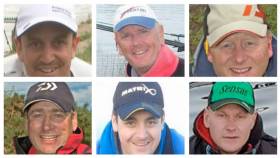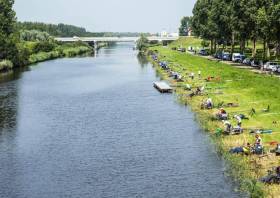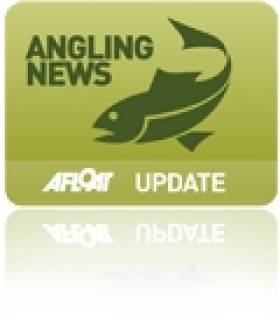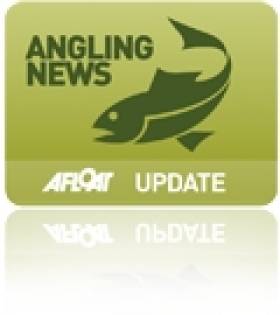Displaying items by tag: NCFFI
Coarse Anglers Converge on Lough Muckno for World Feeder Club Championships This Weekend
Co Monaghan is hosting “the Olympics of angling” this weekend (Saturday 22 and Sunday 23 April) with the World Feeder Club Championships, as RTÉ News reports.
Lough Muckno is the venue for 28 teams representing 18 countries who will fish for the top prize in the competition hosted by the National Coarse Fishing Federation of Ireland (NCFFI).
Local anglers in the Cavan Monaghan Lakelands Feeder Club are joined by one other Irish team from Lurgan Coarse Angling Club in the international field that’s already been a hospitality boon for Castleblayney and environs.
RTÉ News has much more on the story HERE.
Irish Angling Team Announced For 2017 Feeder Worlds
#Angling - The National Coarse Fishing Federation of Ireland (NCFFI) has announced its line-up for the 2017 FIPS-ed Feeder World Championships.
Michael Buchwalder, Nick Howell, Cathal Hughes, Johnny McKinnley, Rimantas Kondrackas and Paul Leese comprise the team to represent Ireland in Portugal this June.
“I am very pleased to be able to present a refreshed world championship team this year, and welcome the three new members to the squad,” said team manager Brenton Sweeney. “In the last three years, Ireland has achieved a team silver medal and four section wins and we are currently ranked 12th in the world.
"It has always been my ambition to introduce younger members to the squad and it’s great to start my second term by welcoming the enthusiastic Johnny and Rimantas along with Nick, who brings extensive knowledge of international championships.
“Former team member Philip Jackson and Paul Heaney of Lurgan CAC will provide support to the team in Portugal and I’m delighted to appoint Philip my assistant manager as we coach these anglers at home and away.
“I would like to take this opportunity to thank the NCFFI and our sponsors for their invaluable support as we look to the year ahead.”
Teams are also being assembled for the European Championships in Italy this May and the Worlds in Belgium in September, as well as the Home Internationals in Scotland the following month.
The NCFFI is a voluntary body, a member of the Angling Council of Ireland and the national governing body for coarse and predator angling recognised by Sport Ireland and SportNI.
Irish Anglers Needed For Coarse Fishing Teams Headed Abroad
#Angling - Tuesday 31 January is the deadline for anglers across the island of Ireland to express their interest in joining one of two teams prepping for international competitions this year.
As the Belfast Telegraph reports, the National Coarse Fishing Federation of Ireland (NCFFI) will be sending teams to the European Championships in Italy on 20-21 May and the Worlds in Belgium on 9-10 September, as well as the Home Internationals in Scotland this October.
Interested anglers should complete the application form available HERE or by January 31 or contact Senior Float Team manager Vincent Walsh at [email protected] or +353 87 256 3669.
Irish Feeder Angling Trials This Month To Select Team For Serbia
#Angling - Feeder anglers should save Saturday 30 January in their calendars.
That's the date for trials for the Irish feeder team headed to Serbia this summer.
All feeder anglers are invited to Annaherrin Lake in Shercock, Co Cavan from 9am for a day's fishing to select the National Coarse Fishing Federation of Ireland's squad.
For details contact 087 251 0260 or email [email protected]
Tributes Paid in Fermoy to Champion of Angling Jack O'Sullivan
#ANGLING - The Corkman has paid tribute to the late Jack O'Sullivan, one of the best known Irishmen in the coarse angling fraternity.
"He is a man who worked hard to put the town of Fermoy, and the stretches of the River Blackwater that enhance it, to the forefront of tourism," the paper writes.
"For 25 years he led from the front, not just by putting Fermoy on the map as a coarse angling destination but also his country, when he brought the likes of the World Coarse Angling Championships to Fermoy in 1968, and many other prestigious events down through the years."
A founder member of the National Coarse Fishing Federation of Ireland (NCFFI), in 2007 O'Sullivan received a gold medal from the organisation for his services to the Fermoy Coarse Angling Association, and angling tourism both local and national.
The Corkman has more on the story HERE.
Dates Announced for Coarse Fishing Qualifiers in 2012
#ANGLING - Qualifiers to select teams for the 2013 World, European and Celtic Cup coarse fishing teams will be fished over six weekends in 2012.
The float and feeder teams for the National Coarse Fishing Federation of Ireland (NCFFI) squads will be decided via an All Ireland Qualifier format to CIPS rules.
Team manager Mark Theedom will select his teams from the top 20 anglers in the float qualifiers and the top 50% of anglers taking part in the feeder qualifiers.
The series will be open to all anglers who are members of NCFFI-affiliated clubs, and is intended to be more inclusive and encourage many more anglers to participate.
All senior anglers will pay an entry fee of €60 for the six-match series which will help fund teams travelling to the 2013 championships. Individual anglers not intending to fish the series but wishing to fish individual qualifiers in their local area will be charged €15. Juniors will not be expected to pay any entry fee.
The qualifier weekends are as follows:
- 21-22 April – River Barrow, Co Carlow
- 19-20 May – Inniscarra, Co Cork
- 2-3 June – River Shannon (O’Brien’s Bridge), Co Clare
- 11-12 August – Lough Muckno, Co Monaghan
- 22-23 September - Lough Oughter, Co Cavan
- 20-21 October – Lower River Bann, Co Antrim



























































